外研版英语八年级上册Module 11 Unit 1 In China ,we open a gift later.课件+嵌入音频(共29张PPT)
文档属性
| 名称 | 外研版英语八年级上册Module 11 Unit 1 In China ,we open a gift later.课件+嵌入音频(共29张PPT) |

|
|
| 格式 | pptx | ||
| 文件大小 | 6.2MB | ||
| 资源类型 | 教案 | ||
| 版本资源 | 外研版 | ||
| 科目 | 英语 | ||
| 更新时间 | 2023-07-14 09:57:57 | ||
图片预览

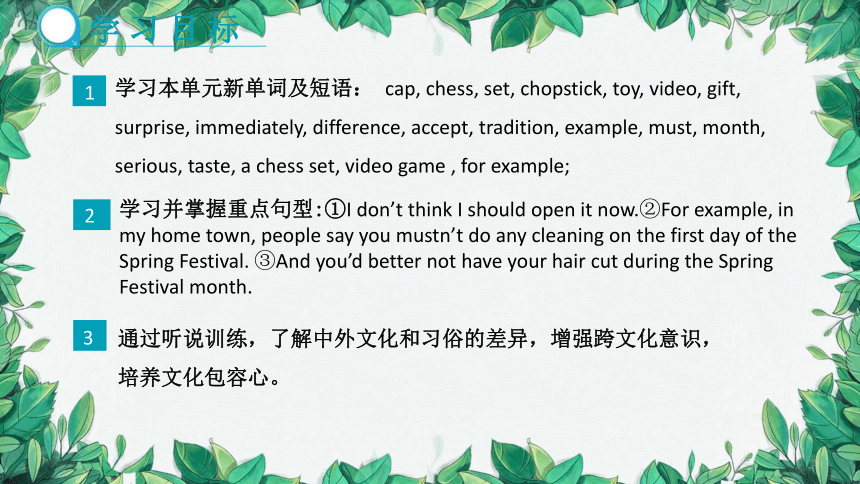
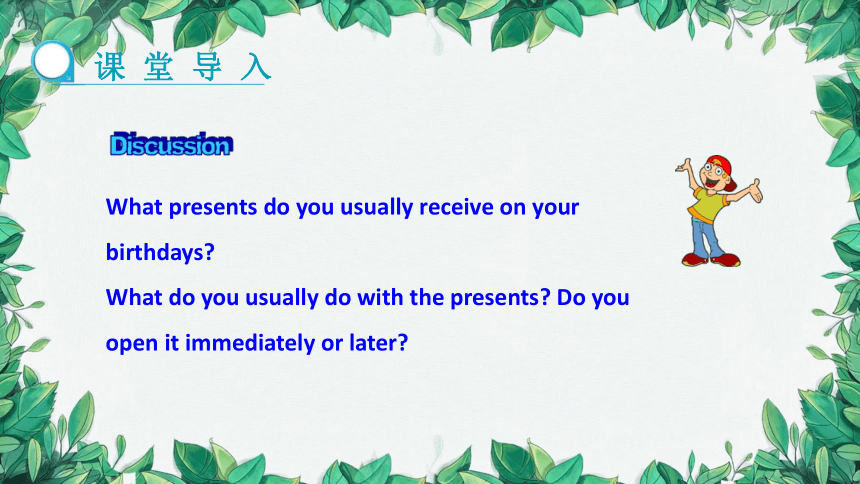

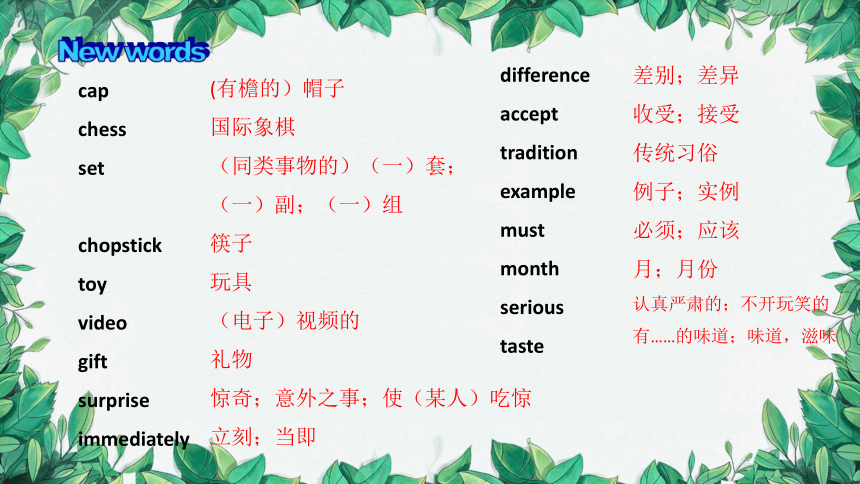

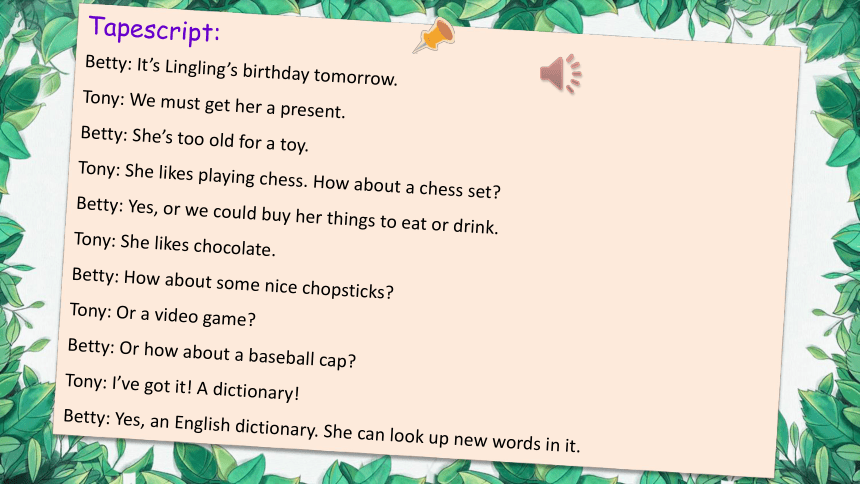
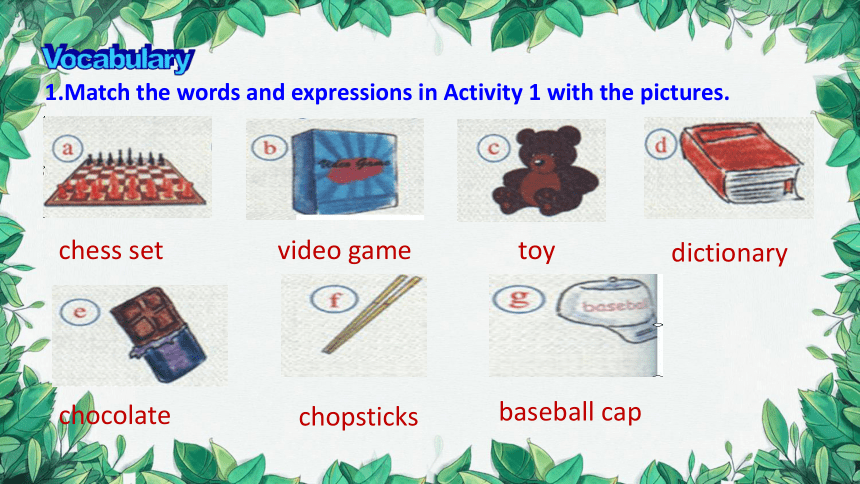
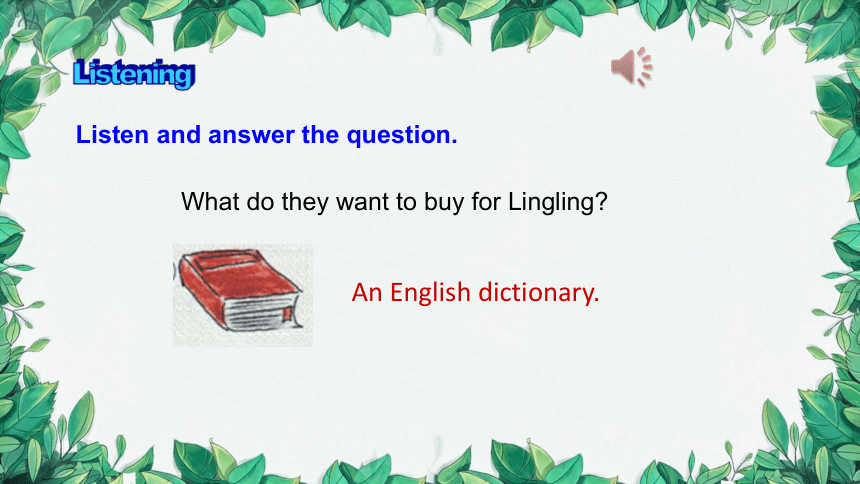
文档简介
(共29张PPT)
Unit 1 In China, we open a gift later.
Module 11 Way of life
学 习 目 标
学习本单元新单词及短语: cap, chess, set, chopstick, toy, video, gift, surprise, immediately, difference, accept, tradition, example, must, month, serious, taste, a chess set, video game , for example;
1
3
通过听说训练,了解中外文化和习俗的差异,增强跨文化意识,培养文化包容心。
学习并掌握重点句型:①I don’t think I should open it now.②For example, in my home town, people say you mustn’t do any cleaning on the first day of the Spring Festival. ③And you’d better not have your hair cut during the Spring Festival month.
2
课 堂 导 入
Discussion
What presents do you usually receive on your birthdays
What do you usually do with the presents Do you open it immediately or later
Listening and vocabulary
课 堂 学 习
New words
cap
chess
set
chopstick
toy
video
gift
surprise
immediately
(有檐的)帽子
国际象棋
(同类事物的)(一)套;
(一)副;(一)组
筷子
玩具
(电子)视频的
礼物
惊奇;意外之事;使(某人)吃惊
立刻;当即
difference
accept
tradition
example
must
month
serious
taste
差别;差异
收受;接受
传统习俗
例子;实例
必须;应该
月;月份
认真严肃的;不开玩笑的有……的味道;味道,滋味
Listen and number the words and expressions as you hear them.
baseball cap chess set chocolate
chopsticks dictionary toy video game
6
3
7
5
2
4
1
Listening
Tapescript:
Betty: It’s Lingling’s birthday tomorrow.
Tony: We must get her a present.
Betty: She’s too old for a toy.
Tony: She likes playing chess. How about a chess set
Betty: Yes, or we could buy her things to eat or drink.
Tony: She likes chocolate.
Betty: How about some nice chopsticks
Tony: Or a video game
Betty: Or how about a baseball cap
Tony: I’ve got it! A dictionary!
Betty: Yes, an English dictionary. She can look up new words in it.
chess set
toy
baseball cap
video game
dictionary
chocolate
chopsticks
1.Match the words and expressions in Activity 1 with the pictures.
Vocabulary
What do they want to buy for Lingling
Listening
An English dictionary.
Listen and answer the question.
1 Open a present immediately when you receive it.
2 Accept a present with both hands.
3 Use red paper for hongbao.
4 Do cleaning on the first day of the Spring Festival.
5 Break something during the Spring Festival.
6 Have your hair cut during the Spring Festival month.
Listen and read. Then check (√) what you usually do in China.
Fast reading
√
√
1 In China, people don’t usually open a gift __________. They open it later.
2 In China, it’s polite for people to use ________ hands to accept a gift.
3 People don’t do any ________ on the first day of the Spring Festival. And they mustn’t ________ anything.
4 People use ________ paper for hongbao in China.
5 In the ________ of China, people eat lots of Jiaozi.
immediately
both
cleaning
1. Read the conversation and complete the sentences.
Careful reading
break
red
north
生日快乐
接受礼物
在西方
注意
happy birthday
accept a gift
in the West
pay attention to
be interested to do sth.
for example
do cleaning
the Spring Festival
bad luck
have one’s hair cut
对做某事感兴趣
例如
打扫卫生
春节
2. Translate the following phrases into Chinese.
坏运气
理发
accept attention surprise taste traditions
It is always a(n) (1)_______ to receive gifts from family members and friends. In China, we usually (2)_______ a gift with both hands and open it later. But in the West, people usually do not pay much (3) _________to that. During the Spring Festival, there are many (4) _________. For example, people in the north of China eat lots of
jiaozi. They (5) ______ great.
Complete the passage with the words in the box.
surprise
accept
traditions
attention
taste
Post-reading
Oh, you remembered!
What a surprise!
It’s bad luck!
You can’t be serious!
Perfect!
Everyday English
Language points
1. What a surprise! 这真是个惊喜!
(1)本句是一个感叹句,语气比较强烈,朗读时通常用降调。
① what引导感叹句,后面接名词性短语。
What a nice bedroom it is! 这是一个多么漂亮的卧室啊!
What good news! 多好的消息啊!
What kind girls they are! 她们是多么好心的女孩啊!
② how引导感叹句,后面接形容词或副词。
How beautiful these flowers are! 这些花多美丽啊!
How heavily it is raining! 雨下得多大呀!
(2) surprise
①名词,意为“惊奇;意外之事”。to one’s surprise意为“使某人惊奇的是”;in surprise意为“惊奇地”。
To our surprise, they finished the work on time.
使我们惊讶的是,他们准时完成了工作。
The little girl looked at the candies in surprise.
小女孩吃惊地看着这些糖果。
② 动词,意为“使(某人)吃惊”,其主语通常是事物。
His words greatly surprised us.
他的话使我们大为吃惊。
[拓展]
① surprising 形容词,意为“令人惊奇的”,多用来指物。
Bill gave a very surprising answer.
比尔给出了一个非常令人惊奇的答案。
② surprised 形容词,意为“感到惊讶的”,多用于指人。be surprised at意为“对……感到惊讶”。
When we heard the news, we were all surprised at it.
当我们听到那个消息,我们都感到惊讶。
2. I don’t think I should open it now. 我觉得我不应该现在打开它。
本句是一个含宾语从句的主从复合句,对从句部分的否定转移到了主句上,这在英语中称为“否定前移”。当同时满足以下两个条件时,应当“否定前移”。
(1) 主句是第一人称,且为一般现在时态。
(2) 主句是谓语动词是think, believe, suppose, expect等。
I don’t think Lucy is at home.
我认为露西不在家。
We don’t believe it is true.
我们认为那不是真的。
3. …you accept a gift with both hands. ……你们用双手接受礼物。
辨析:accept与receive
Lingling received a gift from her friend but she didn’t accept it.
玲玲收到她的朋友的一件礼物,但她没有接受。
accept 接受;收受 表示主观上接受
receive 收到;接收 表示客观上收到
4. For example, in my home town, people say you mustn’t do any cleaning on the first day of the Spring Festival. 例如,在我的家乡,据说大年初一你不能打扫卫生。
for example 例如
用于举例说明,与所举的例子用逗号隔开,所举的事例可以是一个句子,也可以不是。
Many boys in our class like ball games. For example, Daming likes basketball.
在我们班里许多男孩子喜欢球类运动。例如,大明喜欢篮球。
【拓展】such as比如;例如
用于列举事例,后面通常接名词或动名词,其后不能用逗号隔开。
I like ball games, such as basketball, volleyball and baseball.
我喜欢球类运动,比如篮球,排球和棒球。
5. And you’d better not have your hair cut during the Spring Festival month. 另外,正月里你最好不要理发。
have one’s hair cut意为“(请别人给你)理发”,此处cut是动词cut的过去分词。
I usually have my hair cut once a month.
我通常一个月理一次发。
[拓展]
在“have +宾语+过去分词”结构中,过去分词与宾语是动宾关系,表示“请其他人完成这个动作”。
My father had our TV repaired yesterday.
昨天我父亲请人把电视修理了。
6. They taste great. 它们尝起来非常好。
taste此处用作连系动词,意为“有……的味道”,后面通常接形容词作表语。
The cake tastes very delicious.
这蛋糕尝起来味道非常好。
[拓展]
taste还可用作名词,意为“味道;滋味”。
I don’t like the taste of the fish.
我不喜欢这鱼的味道。
Pronunciation and speaking
1 I don’t think I should open it now.
2 You needn’t wait!
3 You mustn’t break anything.
4 You must only use red paper for hongbao.
5 You’d better not have your hair cut during the Spring Festival month.
Now listen and check.
1. Read and predict how the speaker will pronounce the underlined words.
2. Read the sentences aloud.
1 I don’t think I should open it now.
2 You needn’t wait!
3 You mustn’t break anything.
4 You must only use red paper for hongbao.
5 You’d better not have your hair cut during the Spring Festival month.
3. Think about what you must and mustn't/can't do in the situations. Write notes.
Must Mustn’t/Can’t
At school put up your hand before you talk
At the dining table talk with food in your mouth
Now work in pairs. Say what you must and mustn't/can't
do.
eat during the class
wait for others to start meal
1. Read the conversation.
2. Talk with your partner about the Chinese traditions you know.
Homework
Thank you !
Unit 1 In China, we open a gift later.
Module 11 Way of life
学 习 目 标
学习本单元新单词及短语: cap, chess, set, chopstick, toy, video, gift, surprise, immediately, difference, accept, tradition, example, must, month, serious, taste, a chess set, video game , for example;
1
3
通过听说训练,了解中外文化和习俗的差异,增强跨文化意识,培养文化包容心。
学习并掌握重点句型:①I don’t think I should open it now.②For example, in my home town, people say you mustn’t do any cleaning on the first day of the Spring Festival. ③And you’d better not have your hair cut during the Spring Festival month.
2
课 堂 导 入
Discussion
What presents do you usually receive on your birthdays
What do you usually do with the presents Do you open it immediately or later
Listening and vocabulary
课 堂 学 习
New words
cap
chess
set
chopstick
toy
video
gift
surprise
immediately
(有檐的)帽子
国际象棋
(同类事物的)(一)套;
(一)副;(一)组
筷子
玩具
(电子)视频的
礼物
惊奇;意外之事;使(某人)吃惊
立刻;当即
difference
accept
tradition
example
must
month
serious
taste
差别;差异
收受;接受
传统习俗
例子;实例
必须;应该
月;月份
认真严肃的;不开玩笑的有……的味道;味道,滋味
Listen and number the words and expressions as you hear them.
baseball cap chess set chocolate
chopsticks dictionary toy video game
6
3
7
5
2
4
1
Listening
Tapescript:
Betty: It’s Lingling’s birthday tomorrow.
Tony: We must get her a present.
Betty: She’s too old for a toy.
Tony: She likes playing chess. How about a chess set
Betty: Yes, or we could buy her things to eat or drink.
Tony: She likes chocolate.
Betty: How about some nice chopsticks
Tony: Or a video game
Betty: Or how about a baseball cap
Tony: I’ve got it! A dictionary!
Betty: Yes, an English dictionary. She can look up new words in it.
chess set
toy
baseball cap
video game
dictionary
chocolate
chopsticks
1.Match the words and expressions in Activity 1 with the pictures.
Vocabulary
What do they want to buy for Lingling
Listening
An English dictionary.
Listen and answer the question.
1 Open a present immediately when you receive it.
2 Accept a present with both hands.
3 Use red paper for hongbao.
4 Do cleaning on the first day of the Spring Festival.
5 Break something during the Spring Festival.
6 Have your hair cut during the Spring Festival month.
Listen and read. Then check (√) what you usually do in China.
Fast reading
√
√
1 In China, people don’t usually open a gift __________. They open it later.
2 In China, it’s polite for people to use ________ hands to accept a gift.
3 People don’t do any ________ on the first day of the Spring Festival. And they mustn’t ________ anything.
4 People use ________ paper for hongbao in China.
5 In the ________ of China, people eat lots of Jiaozi.
immediately
both
cleaning
1. Read the conversation and complete the sentences.
Careful reading
break
red
north
生日快乐
接受礼物
在西方
注意
happy birthday
accept a gift
in the West
pay attention to
be interested to do sth.
for example
do cleaning
the Spring Festival
bad luck
have one’s hair cut
对做某事感兴趣
例如
打扫卫生
春节
2. Translate the following phrases into Chinese.
坏运气
理发
accept attention surprise taste traditions
It is always a(n) (1)_______ to receive gifts from family members and friends. In China, we usually (2)_______ a gift with both hands and open it later. But in the West, people usually do not pay much (3) _________to that. During the Spring Festival, there are many (4) _________. For example, people in the north of China eat lots of
jiaozi. They (5) ______ great.
Complete the passage with the words in the box.
surprise
accept
traditions
attention
taste
Post-reading
Oh, you remembered!
What a surprise!
It’s bad luck!
You can’t be serious!
Perfect!
Everyday English
Language points
1. What a surprise! 这真是个惊喜!
(1)本句是一个感叹句,语气比较强烈,朗读时通常用降调。
① what引导感叹句,后面接名词性短语。
What a nice bedroom it is! 这是一个多么漂亮的卧室啊!
What good news! 多好的消息啊!
What kind girls they are! 她们是多么好心的女孩啊!
② how引导感叹句,后面接形容词或副词。
How beautiful these flowers are! 这些花多美丽啊!
How heavily it is raining! 雨下得多大呀!
(2) surprise
①名词,意为“惊奇;意外之事”。to one’s surprise意为“使某人惊奇的是”;in surprise意为“惊奇地”。
To our surprise, they finished the work on time.
使我们惊讶的是,他们准时完成了工作。
The little girl looked at the candies in surprise.
小女孩吃惊地看着这些糖果。
② 动词,意为“使(某人)吃惊”,其主语通常是事物。
His words greatly surprised us.
他的话使我们大为吃惊。
[拓展]
① surprising 形容词,意为“令人惊奇的”,多用来指物。
Bill gave a very surprising answer.
比尔给出了一个非常令人惊奇的答案。
② surprised 形容词,意为“感到惊讶的”,多用于指人。be surprised at意为“对……感到惊讶”。
When we heard the news, we were all surprised at it.
当我们听到那个消息,我们都感到惊讶。
2. I don’t think I should open it now. 我觉得我不应该现在打开它。
本句是一个含宾语从句的主从复合句,对从句部分的否定转移到了主句上,这在英语中称为“否定前移”。当同时满足以下两个条件时,应当“否定前移”。
(1) 主句是第一人称,且为一般现在时态。
(2) 主句是谓语动词是think, believe, suppose, expect等。
I don’t think Lucy is at home.
我认为露西不在家。
We don’t believe it is true.
我们认为那不是真的。
3. …you accept a gift with both hands. ……你们用双手接受礼物。
辨析:accept与receive
Lingling received a gift from her friend but she didn’t accept it.
玲玲收到她的朋友的一件礼物,但她没有接受。
accept 接受;收受 表示主观上接受
receive 收到;接收 表示客观上收到
4. For example, in my home town, people say you mustn’t do any cleaning on the first day of the Spring Festival. 例如,在我的家乡,据说大年初一你不能打扫卫生。
for example 例如
用于举例说明,与所举的例子用逗号隔开,所举的事例可以是一个句子,也可以不是。
Many boys in our class like ball games. For example, Daming likes basketball.
在我们班里许多男孩子喜欢球类运动。例如,大明喜欢篮球。
【拓展】such as比如;例如
用于列举事例,后面通常接名词或动名词,其后不能用逗号隔开。
I like ball games, such as basketball, volleyball and baseball.
我喜欢球类运动,比如篮球,排球和棒球。
5. And you’d better not have your hair cut during the Spring Festival month. 另外,正月里你最好不要理发。
have one’s hair cut意为“(请别人给你)理发”,此处cut是动词cut的过去分词。
I usually have my hair cut once a month.
我通常一个月理一次发。
[拓展]
在“have +宾语+过去分词”结构中,过去分词与宾语是动宾关系,表示“请其他人完成这个动作”。
My father had our TV repaired yesterday.
昨天我父亲请人把电视修理了。
6. They taste great. 它们尝起来非常好。
taste此处用作连系动词,意为“有……的味道”,后面通常接形容词作表语。
The cake tastes very delicious.
这蛋糕尝起来味道非常好。
[拓展]
taste还可用作名词,意为“味道;滋味”。
I don’t like the taste of the fish.
我不喜欢这鱼的味道。
Pronunciation and speaking
1 I don’t think I should open it now.
2 You needn’t wait!
3 You mustn’t break anything.
4 You must only use red paper for hongbao.
5 You’d better not have your hair cut during the Spring Festival month.
Now listen and check.
1. Read and predict how the speaker will pronounce the underlined words.
2. Read the sentences aloud.
1 I don’t think I should open it now.
2 You needn’t wait!
3 You mustn’t break anything.
4 You must only use red paper for hongbao.
5 You’d better not have your hair cut during the Spring Festival month.
3. Think about what you must and mustn't/can't do in the situations. Write notes.
Must Mustn’t/Can’t
At school put up your hand before you talk
At the dining table talk with food in your mouth
Now work in pairs. Say what you must and mustn't/can't
do.
eat during the class
wait for others to start meal
1. Read the conversation.
2. Talk with your partner about the Chinese traditions you know.
Homework
Thank you !
同课章节目录
- Module 1 How to learn English
- Unit 1 Let's try to speak English as much as possi
- Unit 2 You should smile at her.
- Unit 3 Language in use .
- Module 2 My home town and my country
- Unit 1 It's taller than many other buildings.
- Unit 2 Cambridge is a beautiful city in the east o
- Unit 3 Language in use .
- Module 3 Sports.
- Unit 1 Nothing is more exciting than playing tenni
- Unit 2 This year we training more carefully.
- Unit 3 Language in use .
- Module 4 Planes, ships and trains .
- Unit 1 He lives the farthest from school.
- Unit 2 What is the best way to travel.
- Unit 3 Language in use .
- Module 5 Lao She Teahouse.
- Unit 1 I wanted to see the Beijing Opera.
- Unit 2 It descibes the changes in Chinese society.
- Unit 3 Language in use .
- Module 6 Animals in danger.
- Unit 1 It allows people to get closer to them .
- Unit 2 The WWF is working hard to save them all.
- Unit 3 Language in use .
- Revision module A
- Module 7 A famous story
- Unit 1 Alice was sitting with her sister by the ri
- Unit 2 She was thinking about her cat.
- Unit 3 Language in use .
- Module 8 Accidents
- Unit 1 While the car were changing to red, a car s
- Unit 2 I was trying to pick it up when it bite me
- Unit 3 Language in use .
- Module 9 Population
- Unit 1 The population of China is about 1.37 billi
- Unit 2 Arnwick was a city with 200,000 people.
- Unit 3 Language in use .
- Module 10 The weathe
- Unit 1 It might snow.
- Unit 2 The weather is fine all year round.
- Unit 3 Language in use .
- Module 11 Way of life
- Unit 1 In China ,we open a gift later.
- Unit 2 In England, you usually drink tea with milk
- Unit 3 Language in use .
- Module 12 Help
- Unit 1 What should we do before help arrives?
- Unit 2 Stay away from windows and heavy furniture.
- Unit 3 Language in use .
- Revision module B
